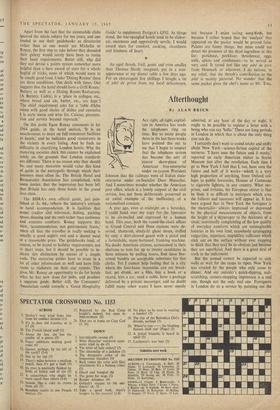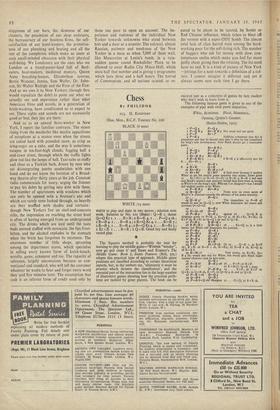Afterthought
By ALAN BRIEN
A, year ago, even at midnight on a Saturday, I could hand over my copy for.,the, Spectator to he-air-mailed and expressed by a human hand. This year, both the round-the-clock offices at. Grand Central and Penn .stations were de- serted, shuttered, dimly-lit ghost shops, staffed by only a shirt-sleeved .guard with a pistol and a formidable, many-buttoned, franking machine. No doubt American citizens, accustomed in their elections• to vote for up to twenty candidates in three minutes by pulling levers, find these five- armed bandits an acceptable substitute for live clerks. Yet I cannot help feeling that in a city where, the foot-loose insomniac can eat break- fast, get drunk, see a film, buy a book or a record, hire a car, send a cable, have a package delivered by a private messenger, and no doubt fulfill many other wants T have never openly admitted, at any hour of the day or night, it ought to be possible to register a letter with a being who can say 'hello.' There are long periods in London in which that is about the only thing you can do.
I certainly don't want to sound tetchy and sniffy about New York-science-fiction capital of the universe. 'I have seen the future and it works,' reported an early American visitor to Soviet Moscow just after the revolution. Each time I go to New York I feel that I, too, have seen the future and half of it works-which is a very high proportion of anything, from Oxford col- leges to public lavatories, Houses of Commons to cigarette lighters, in any country. What sur- prises, and irritates, the European visitor is that he finds it so difficult to anticipate which area the failures and tuccesses will appear in. It has been argued that in New York the foreigner is the materialist-:-alWays' impressed or depressed by the physical measurements of objects, from the height of a 'skyscraper to the thickness of a steak; continually complaining of the low quality of everyday comforts which are unimaginable luxuries in his own land, ceaselessly catalogning vulgarities, injustices, stupidities, callouses which stick out on the surface without ever stopping to think that they may be so obVious just because they are superficial. And there is a great deal of truth in the indictment.
But the nomad cannot be expected to sink wells or wait for the crops to ripen. New York was created by the people who only came to dinner. And our outsider's quick-dipping, nail- scratching, camera-snapping impression is a real one, though not the only real one. Foreigners in London do us a service by pointing out the
sloppiness of our bars, the . slowness of our cleaners, the pessimism of our shop assistants, the bureaucracy of our business firms, the self- satisfaction of our hotel-keepers, the primitive- ness of our plumbing and heating and all the rest of the complaints which make us sneer at such small-minded obsession with their physical well-being. We Londoners are the ones who see London as a travel-poster-land full of Beef- eaters, boot-makers, mediaeval manors, Queen Anne boarding-houses, Elizabethan taverns, Bertie Wooster, Jeeves, Sam Weller, Dr. John- son, Sir Walter Raleigh and the First of the Few. And so we owe it to New Yorkers (though they would repudiate the debt) to point out what we actually see and experience rather than what American films and novels, in a generation of brain-washing, have conditioned us to expect to see. These sights and sounds are not necessarily good or bad, they just are there.
And so as an annual three-weeker in New York, I report the familiar contrasts. The steam rising from the manholes like muslin apparitions of ectoplasm at a seance even when the streets are caked hard with pounded snow, as crisp as icing-sugar on a cake, and the way it sometimes escapes in ten-foot-high clouds, fogging half a mid-town street, through which the traffic lights glow red like the lamps of hell. Taxi-cabs as stuffy and close as a Turkish bath, driven by men who eat disintegrating jumbo sandwiches with one hand and do not know the location of a Broad-. way theatre after thirty years at the job. Constant radio commercials for usury, urging the listener to pay his debts by getting into debt with them. The number of apartments with windows which can only be opened with a fireman's axe and which are rarely even looked through, so heavily are they muffled with. shades and curtains: though New Yorkers live on steel-and-concrete stilts, the impression on reaching the street level is often of having emerged from an underground city. The drinks which are iced until the taste buds seemed stuffed with novocain, the lips frost- bitten, and the alcohol explodes in the stomach when the brain has forgotten its existence. The enormous number of little shops, sprouting among the department stores, which specialise in selling every known form of knick-knack, novelty, game, ornament arid toy. The rapacity of salesmen, largely unconscious because so con- ventional and standard, who will tell the customer whatever he wants to hear and forget every word they said five minutes later. The assumptioh that cash is an inferior form of credit used only by
those too poor to open an account. The im- patience and rudeness of the individual New Yorker towards unknowns who stand between him and a door or a counter. The colossal, almost Russian, patience and meekness of the New Yorker in a mass as when 7,000 of them wait, like Muscovites at Lenin's tomb, in a rain- sodden queue round Rockefeller Plaza to be allowed to enter Radio City Music-Hall, which seats half that number and is giving a programme which lasts three and a half hours. The hatred of Communism, and all nations tainted, or re- puted to be about to be tainted, by Soviet or Red Chinese influence, which itches to blast off the vermin with a super-DDT bomb. The almost total lack of class hatred even among the hard- working poor for the soft-living rich. The number of beggars who ask for money with slow, con- temptuous smiles which make you feel far more guilty about giving than the refusing. The list need have no end. It is a kind of picture of New York —jottings for a note towards a definition of a cul- ture. I cannot imagine it different and yet it always seems new each time I go there.































 Previous page
Previous page